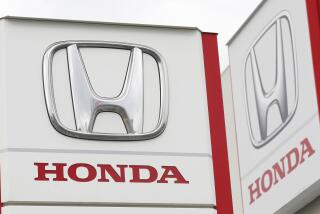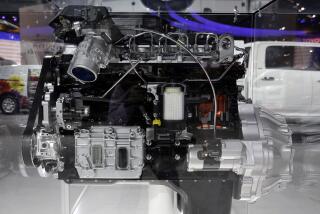Toyota said to reach $1.2 billion settlement in U.S. criminal case

Toyota has agreed to pay a $1.2-billion fine in a settlement with the U.S. government, ending a four-year federal criminal investigation.
Toyota Motor Corp. has reached a $1.2 billion settlement to end a U.S. criminal probe of sudden unexpected acceleration that led to the recall of more than 10 million vehicles, two people familiar with the matter said.
The settlement, which isn’t final, may be announced as early as today, said the people, who asked not to be named because the accord isn’t public. The probe examined whether Toyota made false or incomplete disclosures to regulators about defects in its cars, and how it handled drivers’ complaints, said a third person, who also asked not to be identified.
In addition to the criminal probe by the Manhattan U.S. Attorney’s office and the New York office of the Federal Bureau of Investigation, the recalls also led to lawsuits claiming that defects harmed the value of Toyota vehicles or caused accidents leading to death and injury. Toyota settled lawsuits brought by car owners who claimed economic losses for about $1.6 billion.
The settlement comes as General Motors Co. is being probed by U.S. regulators and officials, including in the FBI’s New York office, after the recall of 1.6 million Chevrolet Cobalts and other small-car models because of faulty ignition switches that it said were linked to 12 deaths. On March 17, GM said it’s recalling 1.55 million vans, sedans and sport-utility vehicles, citing concerns over brakes, seat belts and air bags.
Pedals, Mats
Toyota recalled more than 10 million vehicles worldwide in 2009 and 2010 following complaints of sudden, unintended acceleration. The company made modifications to gas pedals and floor mats that were prone to shifting around and jamming the accelerator. Toyota also installed brake override software on recalled models and began making the systems standard on new vehicles.
Jerika Richardson, a spokeswoman for Manhattan U.S. Attorney Preet Bharara, declined to comment on the settlement. Kelly Langmesser, a spokeswoman for the FBI in New York, declined to comment on it.
“Toyota has cooperated with the U.S. Attorney’s office in this matter for more than four years,” Steve Curtis, a Toyota spokesman, said in an e-mailed statement. “During that time, we have made fundamental changes to become a more responsive and customer-focused organization, and we are committed to continued improvements.”
Curtis declined to comment on a possible settlement.
Shares Fall
Toyota fell 1.4 percent to 5,470 yen at the midday break in Tokyo trading, compared with the 0.4 percent decline by the benchmark Topix Index. The stock has lost 15 percent this year.
The settlement was reported earlier by CNN.
Toyota last year agreed to try to resolve the personal injury and wrongful death lawsuits that were brought in the wake of the recalls.
In a March 17 status report filed in federal court in Santa Ana, California, Toyota and lawyers representing the plaintiffs said they had reached agreements in principle to settle 131 cases. The carmaker is trying to settle more than 300 cases, according to the filing.
Terms of the settlements weren’t disclosed.
The recalls damaged the quality reputation that spurred Toyota’s rise to become the world’s largest automaker, a title that it relinquished for one year to GM, the largest U.S. automaker, after Japan’s earthquake and tsunami, along with floods in Thailand, disrupted its 2011 vehicle production.
Toyota has regained the global sales crown the past two years and returned to rank at or near the top of automotive quality ratings. Consumer Reports this month recommended 11 of the company’s cars in its picks for the best used vehicles from the last 10 model years, almost double the tally for Honda Motor Co., the second-best performer.
J.D. Power & Associates said last year that while GM outperformed Toyota in its annual Initial Quality Study for the first time, the Japanese carmaker’s namesake brand and Lexus luxury division both finished among the industry’s top seven brands.
More to Read
Inside the business of entertainment
The Wide Shot brings you news, analysis and insights on everything from streaming wars to production — and what it all means for the future.
You may occasionally receive promotional content from the Los Angeles Times.










